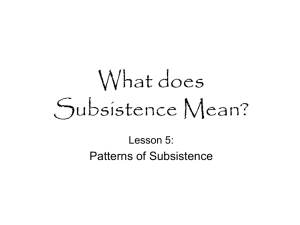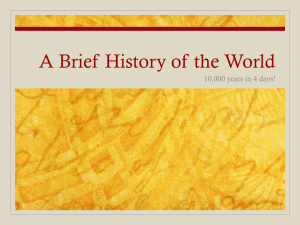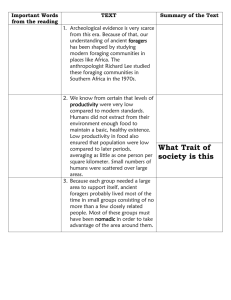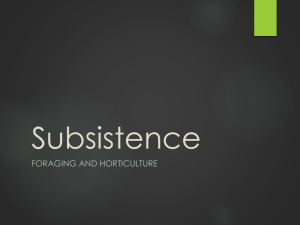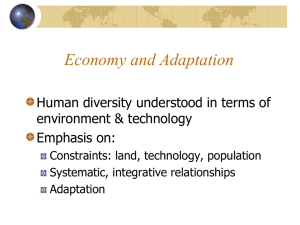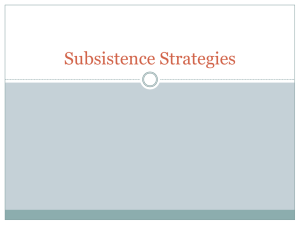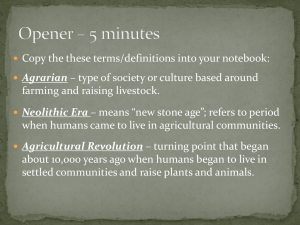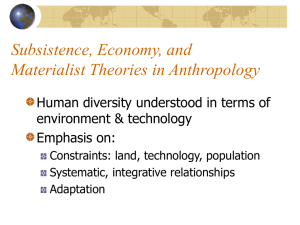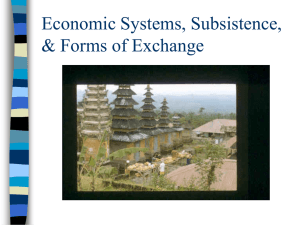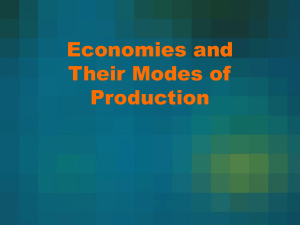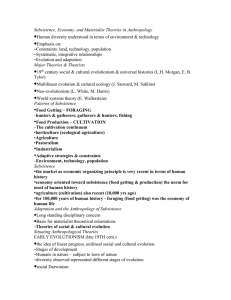Powerpoint, print
advertisement
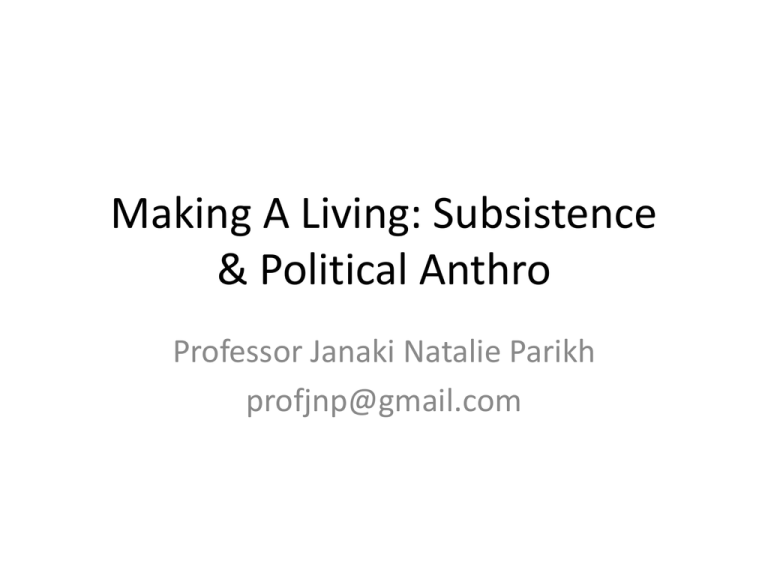
Making A Living: Subsistence & Political Anthro Professor Janaki Natalie Parikh profjnp@gmail.com Subsistence Techniques • 4 subsistence strategies we’ll cover: – Foraging, a.k.a.? – Horticulture, a.k.a. Shifting cultivation – Agriculture – Pastoralism • Subsistence strategies are simply techniques, not social types • Avoid falling into a unilinear way of thinking Types of Political Organization • E. Service: • • • • • Band Tribe Chiefdom Nation state Today any of these exist w/in context of the nation state Adaptive Strategies • Ppl mix techniques of production • Cohen: adaptive strategies, claims societies w/ common adapt. Strategies usually share other cultural characteristics in common • Why? • Similar economic causes tend to yield similar cultural effects Foraging • • • • • • • • Foraging: a.k.a. hunting/gathering, wild foods No domesticatn of plants & animals Egalitarian, what does that mean? Relative equality in dist. of resources & status Trop. Foragers: soc. Stratificatn based on age Northern foragers: age & gender Thus, No. foragers less egalitarian, why? Tropics offer more biodiversity Foraging cont’d • Hunting is ↑ presitigious (yet, who contributes more to the diet?) • On avg. ♀ gatherg contrib’s 60-75% caloric intake • Myth : foragers are always on the brink of starvatn • Reality: a well balanced & nutritious diet (oft. moreso than our own) • How to maintain egaliatarian dynamics? • Sharing the arrows & insulting the meat Foraging cont’d • Foraging requires far fewer hrs. to make sure everyone is provided for • How many hrs per wk to do so? • ~20 hrs. per wk!!! Compare this to our avg. 40 hr work wk, plus overtime, school, etc… • Modern foragers losing ancestral lands, constant encroach of industrialized nation states Foraging cont’d • Modern foragers do not live in isolation, not relics of the past • They are a part of the modern world system • Politial Organizatn: band, small sized grp (~100ppl) related by blood &/or marriage, no formal authority figure/leader • Why the small sized group? Foraging cont’d • Foraging requires access to land, if they become lose land, they run the risk of…? • Excess depletion of resources • Tropics: Ju’hoansi San of the Kalahari Desert (where?) • Northern: Inuit of Quebec Horticulture • Horticulture: a.k.a. shifting cultivatn • Oft. involves slash & burn techniques • Portrayed as destructive to the environ., yet, is actually sustainable. Longterm intensive ag. does what to land? http://www.pbs.org/earthonedge/ecosystems/agricultural1.html • Fallowing: allowing land to regenerate • Planting multiple difft crops • Crops mimic nat’l environ. Horticulture • Typically ↓ pop. Density, though some villages can be as many as 1000 ppl. • Examples: Yanomamo of Brazil (Amazon) & Etoro of Papua New Guinea • http://anthro.palomar.edu/subsistence/images/map_of_horticultural ists.gif Horticulture • Political organization: Tribe (also possibly chiefdom) • No formal govt. authority, contrary to pop. portrayal: tribes don’t have chiefs! • May be larger size than bands, live in villages, organized into smaller kin groups Horticulture • Political organization: Chiefdom • Intermediate in sz. & complexity • Features a permanent politcal structure & differential access to resources • Typically kin based & may be a hereditary title Agriculture • • • • • Requires ↑ investmt of means of production Irrigatn, ctrl the amt of water used, terracing? Maximizing land usage Downside: Less crop diversity: few staple crops nutritional loss, environmental degredation, assoc. w/ entrenched gender stratification • http://www.michaelpollan.com/indefense.php Agriculture • Enables task specializatn • Suitable for supporting dense populations • Allows for growth of empires, formation of larger political units (e.g. nation state) • Industrialized agriculture: assoc. w/ ecocide, & increased social stratification http://fora.tv/2009/05/05/Michael_Pollan_Deep_Agriculture#fullprogra m Agriculture • Political organization: typically nation state (though possibly a chiefdom) • Nation states: vary in sz. & complexity as well as type of govt: monarchy, democratic republic, theocracy… • Requires high degree of regulation: legal & judicial system, law enforcement, etc. Pastoralism • Caring for herd animals, what animals? • Do not regularly slaughter their animals, too valuable, rather, subsist off their products • Dairy, wool, blood, leasing studs • Typically have to supplement subsistence Pastoralism • Migratory patterns: – Pastoral nomadism: entire grp moves – Transhumance: part of grp moves w/ herds • Nuer: E. Africa- herd cattle & supplement • Rainy season: highlands, combo w/agriculture • Dry seas.: lwr elevatns, near rivers, supplement using? • Fishing (a type of foraging) Nuer Political Organization • Segmentary lineage: type of political organization associated with tribes • Ex.: Nuer, remember them? • System of closely related lineages • A B C D E F G H Economy • Economics from an anthropological lens, difft emphasis: cross-cultural • Econ. tends to focus solely on modern pwrhouse nations • Econ concept: scarcity (meaning?) • Insufficient means, lmtd availability/supply • A human universal? Kottak text box, discuss • No, scarcity is culturally constructed Economic Anthro – 3 principles orienting exchange: – Market principle – Redistribution – Reciprocity • Market principle: dominant in our world capitalist economy • Val. determined by law of supply & demand • bargaining Economic Anthro • Redistributn: good & svcs move from local level to a ctrl lvl., then redivvied out • Cherokee ex.: fam. farm sent portn of harvest to leader, this was given to warriors, travelers, etc. • Modern USA, ex.? • DMV: fees sent to ctrl lvl, • Redist. How? Reciprocity • 3 types: – Generalized – Balanced – Negative • The type of reciprocity is correlated w/ the closeness of the relatnship btwn the parties • W/ balanced, not keeping the balance will cause the relatnship to suffer Reciprocity cont’d • Generalized: no accounting kept & no expectation of return “in kind” Ex.: healthy relatnship btwn parent & child • Balanced: expectatn of “in-kind” exchange, gift giving relatnship • Negative: attempt to get something for as little as possible (may involve cheating, swindling, etc.) Examples? Potlatch • Practiced amongst Pac. NW tribal grps (e.g. Kwakiutl) spaning from N. Cali to Alaska • Festive event that is part of a regional exchange system, in other words… • It’s a big party! Not just any party, hosts give away enormous amts of wealth, in Turn they receive? Prestige. Potlatch • Suttles & Vayda: serves as a soc. security mechanism, redistributes wealth by converting it to prestige • Overall, environ is favorable, but resources fluctuate, potlatch creates regn’l alliance • Difft spin on abundance than capitalism
